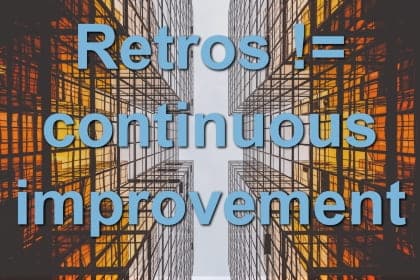- You are here:
- Home »
- Agile
Category Archives for Agile
Retros are not continuous improvement

Retrospectives are one of the hallowed traditions of Agile software development. They are mentioned specifically as one of the twelve principles in the Agile Manifesto. They are one of only four regular activities prescribed in the Scrum guide. Extreme Programming says you must “fix XP when it breaks” (and talks a bit about retrospectives in that […]
Continue readingTechnical debt – or technical bankruptcy?

It’s time we admit we have a problem with technical debt. Everyone knows what it is, everyone is talking about, but not enough is being done about it. Time and again I have seen teams and systems end up swamped in technical debt. Swimming and eventually drowning in the stuff. Until entire projects have to […]
Continue readingThe Lean wisdom at the heart of Agile

I had a discussion a little while ago with someone about what Agile is fundamentally about. The true, inner core of it. I gave some rambling and clumsy explanation. He gave a much better one: “Embracing change, and efficient collaboration”. This seemed fine at the time, but something started bugging me about it. It seemed […]
Continue readingAgile managers – what do they do?

People might be wondering what managers do in an Agile organisation. You might wonder if they are still needed. Agile managers aren’t measuring or forecasting anymore, because your teams should do their own measuring and forecasting. They don’t micro-manage people’s work anymore because teams are empowered to work how they want. So if we still […]
Continue readingAgile metrics: you’re doing it wrong

I’ve been spending more time reading forums, groups and Quora about Agile. I’ve noticed a type of question coming up over and over again. People seem obsessed with finding the answer to the misguided question “what are the best metrics and KPIs we can use for measuring our teams in Agile?”. I’ve talked before about […]
Continue readingMyths of agile: Agile means fast and cheap

I thought I was finished with my “myths of Agile” series. But I’ve come across another one that still rears its ugly head from time to time. The idea is that everybody should all do Agile because it means you can do the same work, but “faster” and “cheaper”. Which is everyone wants. Right? Agile […]
Continue readingBimodal IT theory

A few years ago, research organization Gartner came up with this concept called Bimodal IT theory. This basically said that for any large organisations, there are two types of IT systems. These types serve different purposes, are built with different technologies, serve different customers, have different cost and risk profiles, and should be kept separate. And […]
Continue readingWhat is Test Driven Development (TDD)?

Test Driven Development or TDD is a technical practice that is often used by people doing Agile software development. It is a different approach to both testing and development. It can be difficult and cumbersome at first, but many people believe that it has big payoffs in the long term. I’ll talk about what those […]
Continue readingLet’s stop talking about requirements

I get a bit sad when I hear the word “requirements”. It is a word that strongly reminds me of the bad old Waterfall days. We don’t want a return to that way of thinking. So let’s find a better approach, more in line with the agile mindset. The origin of requirements Back then, we […]
Continue readingThe most common reason Agile fails

There are plenty of examples of Agile going wrong. Big government projects trying Agile and crashing and burning. Or “Zombie scrum”. Or “Cargo Cult Agile”. These are all sad stories and all too common. So what goes wrong? There are lots of reasons. Some of them are cultural, some of them are technical, some of […]
Continue reading